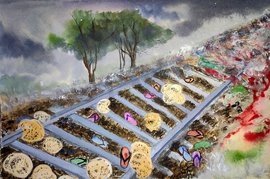Her daughter pulled the old book off the second shelf above the mattress. It was the one given to her by the lady who ran a day-school and a night-shelter for the children of the area. She had sensed the child’s interest in reading and given her the book. “Ma, can I read you a story?” Nine-year-old Pinky settled down next to her mother, clutching the tattered book in hand, and without waiting for her mother’s reply started reading her favourite story, The Paperbag Princess .
The smelly, bumpy gadda mattress on which she lay with her mother carpeted the entire living space of the tiny, boxy cabin that Pinky called home. Seeta had to pay Rs. 6,000 a month to give her two children this – an apology for a home. It gave neither safety nor warmth. It actually felt no different from the thandi sadak , the cold street where the landlady threw out the HIV-positive girls. Even these unforgiving times of the nayi bimari (Covid-19) did not stop her. Last week it was the turn of Roshni, Seeta’s good friend. She had sighted Roshni sleeping on the road the previous night, while she pounded the pavement on the opposite side looking for a now-rare client. She snapped herself back to the present. The paperbag princess was already chasing the dragon in a bid to free the prince, and her daughter’s voice was continuing to drone on and on. There was still time before the final encounter with the despicable prince, so Seeta allowed her mind to wander again.
She hopelessly wondered about her 15-year-old son. She was past spending nights worrying about him, or setting out on expeditions from police stations to railway stations to look for him. This was the third time he had left home without warning, and it was the longest he had stayed away. A week had gone without even a phone call. She had known the restlessness of his heart, his obstinate refusal to accept the cards he had been dealt, the impatience of his spirit to fly out from the snares of this alley. She knew it all. She had saved the train ticket from 20 years ago in the plastic bag kept on the shelf. Her heart ached for a brief moment. She was barely 12 years old...
Pinky’s story had come to an end.…

Kamathipura
The sky comes
cramped in 4 x 6 boxes
Perennial grey
Wingless bodies flutter
on grimy Khajuraho walls
Hope hangs suffocated
in dusty plastic bags
from neglected shelves.
Little by little
a rotten smell of time
left behind infiltrates
her rib cage
She wears desiccated wounds
on her body
self-embroidered grey
charcoal on steel
and waits out in the open
waving at the moonlight
waiting for a touch of soothing silver
on the dark and lonely pavements
of Falkland Road
While her son chases dragonflies
on dim-lit asphalt streets
in strange towns
and her daughter
dreams of pink
living in a black ‘n white world.
Audio: Sudhanva Deshpande is an actor and director with Jana Natya Manch, and an editor with LeftWord Books.
Read the two stories that inspired this poem: 'Everyone knows what happens here to girls' and Such a long journey, over and over again .




